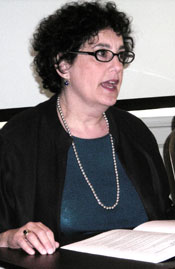Because of a lapse in government funding, the information on this website may not be up to date, transactions submitted via the website may not be processed, and the agency may not be able to respond to inquiries until appropriations are enacted. The NIH Clinical Center (the research hospital of NIH) is open. For more details about its operating status, please visit
cc.nih.gov. Updates regarding government operating status and resumption of normal operations can be found at
opm.gov.
State Department to ease visa delays
May - June, 2009 | Volume 8, Issue 3

Dr. Patricia Wrightson directed a
National Research Council study on
the problem foreign scientists
have in getting visas.
The State Department has put new procedures into place to ease what U.S. scientists had called an embarrassing and economically dangerous backlog of visa applications from foreign researchers.
The new policy went into effect at the end of May, and additional consular staff has been assigned to clear the bottleneck. Approval of routine applications is expected to take no more than two weeks.
After Sept. 11, the flow of foreign scientists began to slow as the Department slowed down the approval process based on concern that visitors might engage in illegal trafficking of high technology products—interpreted in some cases as medical knowledge.
Earlier this year, the National Research Council issued a report urging a change in policy and reform of a hodgepodge of outdated export controls.
Dr. Norman Neureiter, a member of the NRC scientific and national security panel that wrote the report, "Beyond Fortress America: National Security Controls on Science and Technology in a Globalized World," and Dr. Patricia Wrightson, who headed the study, told Fogarty and other NIH staff of the problems caused by the backlog.
They recounted stories of prominent scientists blocked from entering the United States to speak at international conferences and of graduate students legally working in America prevented from re-entering after returning home for family emergencies.
Neureiter and Wrightson blamed the anti-terror mood of the Department of Homeland Security for superseding the State Department's traditional role in approving visas.
"What we're trying to do is bring some coherence into the internal bureaucracy," Wrightson said, proposing that export control and visa policies equally involve the Pentagon, State Department, National Security Council and the Commerce Department.
When the report was issued, committee co-chair and former White House national security adviser Gen. Brent Scowcroft said, "[The United States] needs to change to a philosophy that everything is open and restricted only when it is demonstrated that it needs to be."
The report said negative "unintended consequences arise from policies that were crafted for an earlier era. In the name of maintaining superiority, the United States now runs the risk of becoming less competitive and less prosperous; we run the risk of actually weakening our national security."
Neureiter called the delay in allowing top scientists from India and China into the country "another diplomatic disaster for the United States. ... In my opinion, we are paying a terrible price for this. ... What more can you do to alienate a country (China) with whom we must have maximum transparency and the highest degree of cooperation if we are going to avoid an eventual clash with these people?"
Among the report's recommendations for President Obama to consider in any Executive Order:
- The visa application process should be streamlined, with preference given to the skills of foreign researchers and students.
- Student visas should be extended so that recent graduates have time to find work with U.S.-based employers.
- Qualified American scientists should be allowed to vouch for the legitimacy of visa applicants.
- Lists of exportable technology and knowledge should be frequently reviewed, with the burden of proof on the government.
To view Adobe PDF files,
download current, free accessible plug-ins from Adobe's website.